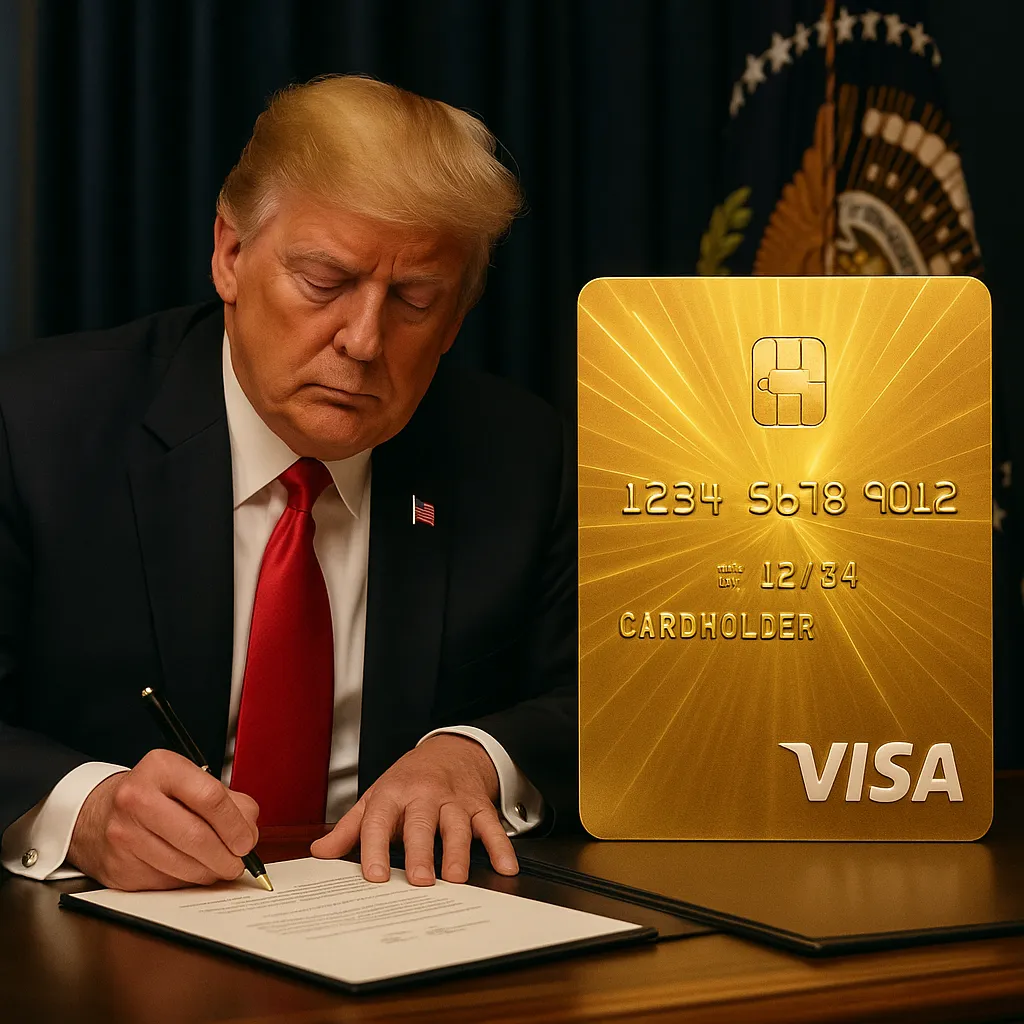Trump Unveils “Gold Card” Visa and Imposes $100,000 H-1B Fee in Major Executive Actions

WASHINGTON, Sept. 19, 2025 - President Donald Trump today signed two sweeping executive directives in the Oval Office to overhaul U.S. immigration rules, creating a $1 million “Gold Card” fast-track visa and imposing a new $100,000 annual fee on H-1B workers.
In a drive to prioritize American jobs and boost federal revenues, the orders establish a premium visa for wealthy investors and dramatically raise costs for high-skilled foreign labor, reflecting Trump’s campaign pledge to curb perceived abuses and strengthen national security.
Nut Graf
The “Gold Card” program lets individuals pay $1 million (or $2 million for corporate sponsors) for expedited permanent-residence consideration, while the H-1B fee aims to deter employers from hiring non-U.S. workers at lower wages and channel funds toward tax cuts and debt reduction. Together, these measures mark the most aggressive immigration overhaul of the Trump administration’s second term.
Key Executive Actions
- Gold Card Visa:
- $1 million fee for individuals, $2 million for businesses
- Targets entrepreneurs, investors, and high-net-worth foreigners
- Revenue earmarked for tax relief and deficit reduction
- H-1B Fee Increase:
- New $100,000 annual surcharge on each H-1B petition
- Requires payment at petition filing or entry
- Aims to protect American workers by discouraging low-cost foreign labor
Details and Rationale
Trump framed the Gold Card as a reward for those “who advance the interests of the United States by voluntarily providing a significant financial gift”. He predicted the program will generate over $100 billion for infrastructure, tax cuts, and national debt service.
Commerce Secretary Howard Lutnick announced plans for a future “Platinum Card” - a $5 million visa allowing up to 270 days of U.S. residency tax-free - pending congressional approval.
On the H-1B front, a White House fact sheet states the new fee will curb program abuse and ensure employers “either hire Americans or pay premiums to bring in top talent,” with case-by-case exemptions for national-interest applicants.
Reactions and Next Steps
Industry groups warn the fees could hamper U.S. competitiveness in technology and research sectors. Tech CEOs are weighing legal challenges, while Congress debates regulatory rulemaking on prevailing wage levels and enforcement guidance.
Further rule-making from the Departments of Labor and Homeland Security is expected within months to implement wage revisions and compliance audits. Republican lawmakers broadly praised the moves as fulfilling Trump’s promise to prioritize domestic workers.
Political Context
This announcement follows midterm election gains for Trump-aligned Republicans and comes amid heightened debates over border security and labor markets. The administration argues the new revenue streams will fund key priorities without raising taxes on Americans.
- (The Hill; Politico; NPR)
Categories
Autos and vehicles Beauty and fashion Business and finance Climate Entertainment Food and drink Games Health Hobbies and leisure Jobs and education Law and government Other Politics Science Shopping Sports Technology Travel and transportationRecent Posts
Tags
Archives
08/19/2025 (3) 08/20/2025 (40) 08/21/2025 (27) 08/22/2025 (22) 08/23/2025 (4) 08/24/2025 (21) 08/25/2025 (30) 08/26/2025 (24) 08/27/2025 (29) 08/28/2025 (16) 08/29/2025 (9) 08/30/2025 (13) 08/31/2025 (17) 09/01/2025 (167) 09/02/2025 (124) 09/03/2025 (149) 09/04/2025 (112) 09/05/2025 (72) 09/06/2025 (169) 09/07/2025 (162) 09/08/2025 (150) 09/09/2025 (176) 09/10/2025 (194) 09/11/2025 (194) 09/12/2025 (186) 09/13/2025 (207) 09/14/2025 (159) 09/15/2025 (175) 09/16/2025 (198) 09/17/2025 (196) 09/18/2025 (196) 09/19/2025 (207) 09/20/2025 (129) 09/21/2025 (4)